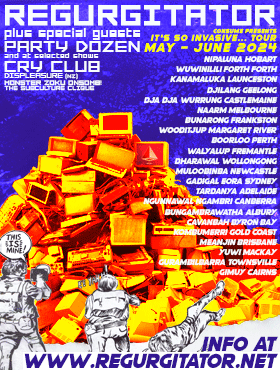June 2003. By Greg Phillips
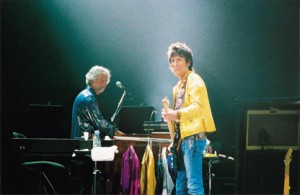 There’s something almost romantic (in a rock n’roll kind of way) about entering the Rolling Stones lair. It’s a place where many a rock n’ roll legend was born, a place where you never believe you’ll ever find yourself. Of course times have changed, not so much of a need to lock up your daughters when the The Stones hit town now. Nevertheless, there was still an element of surrealism as I walked through the lobby of Melbourne’s Park Hyatt Hotel on my way to speak with The Stones’ piano player of 20 years, Chuck Leavell while he was in town with the band on their Forty Licks tour. Any image of rock n’ roll excess, pretentiousness, and even perception of where I actually was disappeared quickly as Chuck invited me to “Come on in.” Chuck is as down-home as they come and made Marty, our photographer and myself feel like we were old friends who had come to visit.
There’s something almost romantic (in a rock n’roll kind of way) about entering the Rolling Stones lair. It’s a place where many a rock n’ roll legend was born, a place where you never believe you’ll ever find yourself. Of course times have changed, not so much of a need to lock up your daughters when the The Stones hit town now. Nevertheless, there was still an element of surrealism as I walked through the lobby of Melbourne’s Park Hyatt Hotel on my way to speak with The Stones’ piano player of 20 years, Chuck Leavell while he was in town with the band on their Forty Licks tour. Any image of rock n’ roll excess, pretentiousness, and even perception of where I actually was disappeared quickly as Chuck invited me to “Come on in.” Chuck is as down-home as they come and made Marty, our photographer and myself feel like we were old friends who had come to visit.
Musically, Chuck is an old friend to many of us. His first contribution to rock history was as keyboard player with the Allman Brothers on their legendary Brothers and Sisters album. From the Allmans he formed the 70s instrumental band many musicians still hold in high regard, Sea Level (note the name C.Leavell!). Recordings and gigs followed with Eric Clapton, George Harrison, Aretha Franklin, The Marshall Tucker Band, Indigo Girls and many more contemporary music icons. In 1982 he joined the Stones’ Tattoo You tour and has been with the band ever since. He’s not only a fine piano player, he’s also an incredibly knowledgeable and thoughtful conservationist. He owns a timber plantation/ nature reserve in Georgia and has just released a book on forestry called Forever Green. A companion piece to the forestry book is his beautiful and eloquently played solo piano CD called Forever Blue. Needless to say, there is much to discuss with Chuck Leavell.
The solo album that you’ve just released ‘Forever Blue’, was that recorded at home?
I recorded this at my friend Paul Hornsby’s studio. I wanted to do some of it at my place, but I was having technical problems with my studio at the time and I was in a hurry to get into the studio. I thought why not just call Paul, he’s twenty minutes away, has a nice studio. I thought it would be nice to have someone on the other side of the glass to critique and help engineer it.
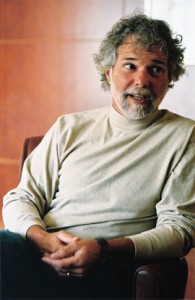 Was it very long in planning?
Was it very long in planning?
I was well overdue for a solo album. I kept getting calls to go on tour, and I kept procrastinating. During the last two Stones’ tours I spent a lot of time in the dressing room on a digital piano, writing and practising. At the same time I was writing a book, Forever Green my book on forestry. I wrote the book Forever Green because I felt there was a lot of misunderstanding in the world on what forestry is. There are those who say you should never cut a tree. Well if you don’t cut a tree, you are not going to have that piano or nice piece of furniture or house or even magazines. The important thing is how you do it? While I think the word sustainability is well overused, basically the concept is correct. You want to make sure you are planting , growing and managing more wood than you are harvesting. It’s as simple as that. So I was working on both the book and album and I thought why not bring them out at the same time. The CD I called Forever Blue, mainly because I’m a blues player no matter what. I thought it would be an interesting concept to marry the two together and promote them together. I thought it was just a wonderful way to make a statement about the resource of wood, and doing an album using an instrument that is made of wood.
Let’s talk about your gear … your main synthesiser is a Korg Triton?
I’ve been associated with Korg for a long long time. I think they make really great gear. The Triton is a multi-faceted, multi capable instrument. I use it for a lot of things, but also on stage I use a Yamaha P200, for the piano. I also use a MIDI B which is a Hammond organ fitted with MIDI by a company called Keyboard Specialities that is in St. Petersburg Florida. Paul Homb is the guy who fitted it out and he’s the best I know of with the Hammond Organ. Not only does he know the Hammond and the Leslie, but he does a great job of putting together a combination that you’re looking for. Not only do I have a B3 from him but also a 8100 that I bought too. He does a great job of fitting them with MIDI, which has been great for me particularly with Clapton and The Stones. A lot of the times I will have my piano assigned to the lower manual and playing chords and comps with my left hand on the B3, then on the upper manual I get to use the organ sounds. I also have a good ol’ Wurlitzer, an old noisy thing. It still makes a sound that is hard to reproduce accurately but I enjoy using that. Also a Kurzweil sampler that we get a couple of sounds out of sitar sounds which I use on ‘Street Fighting Man’. A couple of times I use the Wurlitzer sounds on the Triton which are very, vary good. We use it for all the string sounds on songs like ‘Angie’ or ‘Paint It Black’. We use it for choral sounds on ‘Can’t Always Get What You Want’ for that big vocal build up at the end.
What were you using in The Allman Brothers days?
We carried a Steinway, with a Countryman pickup to get it through the amplification. Greg Allman played B3, and I also used a Fender Rhodes. We would do these long solos. I would get to play a 10 minute solo if I wanted. I got into muting the piano strings as something interesting to do during the course of my solo. Our roadie at the time , Dwigts London saw me doing that and he was very inventive. He said if you’re doin’ that, you can’t use both hands, I’d like to come up with a piano mute for you. So he did. It was an incredible thing that went across the top of the harp of the piano. It used hydraulics and was connected to a foot pedal. The hydraulics would push the mute down on top of the strings.
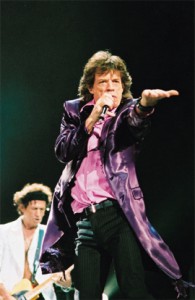 When you joined The Stones, was there anything that surprised you about the band?
When you joined The Stones, was there anything that surprised you about the band?
What surprised me was their knowledge of American roots music, much broader than my own. I think it was more precious to them growing up than it was to us in America. It was difficult for them to get the kind of records they wanted to hear. They studied it a little closer. They knew all the labels and what year things were recorded, and all the musicians that played on them. Charlie fascinated me too with his knowledge of jazz. I was a fan as a kid playing Rolling Stones records at the YMCA. I knew the work, and it wasn’t difficult for me to fit in. I had the attitude of just do what you gotta do. Either it works or it doesn’t, don’t try to adjust yourself to be someone you’re not. That was my attitude and I think it served me well.
Did you go back and listen to Ian’s and Nicky’s playing?
I knew it pretty well. When Beggars Banquet came out we played that thing 40 times in a row. I remember where I was when I first heard ‘Honky Tonk Woman’, even though it doesn’t really have a piano on the record. Sure I went back in a few cases and did some detail work just to get things a little more proper, if you will. That gave me an even better respect for those players. Nicky Hopkins was a master musician, I call him the motif master. He had an amazing way of coming up with little phrases, much like Keith has a talent for riffs. Nicky had a gift of the little quick melody, the motif. Billy Preston, goes without saying he’s the funk master and has that gospel thing. He was already an influence on me before he was working with The Stones. Stu, I didn’t know who Stu was until all this came about . Stu didn’t like playing on slow songs. I would say Stu, you’re a great player , why aren’t you on all the Stones songs?” Why Nicky Hopkins and Billy Preston, all these other guys?” He said “I don’t like slow songs, they’re boring, don’t like minor chords they sound Chinese”. All he wanted to do was to play the boogie stuff. He was wonderfully eccentric.
A lot of players say that when they’re playing live, they listen to the drummer, or sometimes the bass player. In the Stones who does your ear hone in on?
I think it is so important to listen to everything, and I try to do that no matter what band I’m playing in. I’m all ears man. To me that’s the most important thing a musician can do because you never know who is going to come up with a little something you can build on. But I gotta say Charlie Watts is the driving force behind this band. I’m very comfortable when I can hear Charlie really well. If I am physically close to him like I am on the B stage, that makes it even better. (The Stones used a second stage on this tour which sat at the opposite end of the venue to the main stage, consequently everyone got to see them up close)
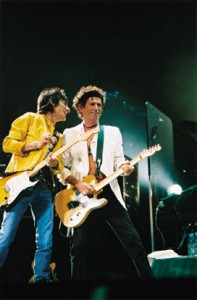 Are there some nights when you feel the playing is at another level?
Are there some nights when you feel the playing is at another level?
Yeah sure. I’ll say this about the band. When I first came into the band in ’82, it was a lot looser than it is now. I think the band was reborn in ’89 on the Steel Wheels tour. I think the attitude before was, “let’s just go play” and not worry about things so much. They had a huge body of work, but often times it was a bit sloppy. In ’89 I think there was a concerted effort to tighten things up. There was an effort to rehearse and make it tighter, and make it as good as it can be. But within the confines of The Rolling Stones, with that caveat, because you don’t want a perfect Rolling Stones now! If you have that it doesn’t work. It’s gotta fall apart every now and then … and it does. That’s something else I’ll say about this band. Groups I have been with in the past, they have taken themselves too seriously. You know, you have an accident on stage, a minor train wreck and everybody freaks out, gets upset. With the Stones it’s like “wasn’t that cool”. That’s a tradition with the Stones. In the twenty years I have been with the band, I truly believe this is the best we’ve sounded.
What do you see your role as?
Well it’s not a role to step out and do long solos like in The Allman Brothers band. My role I think is to be a catalyst. Aside from being a musical catalyst, I also see my role as being a catalyst to keep track of this enormous body of work. Which I do. I have these two huge books which I’ve kept over the years. Every time we rehearse a tune , I do a chord chart and often we’ll do changes from the record and I’ll make a note of that. If we’ve changed the horn arrangement or changed the background vocals, sometimes the keys have changed. It’s Only Rock n Roll was in the key of E on the record and we do it in B. So I keep this database. Often times Keith will ask what key is Dead Flowers in or “what’s the bridge?”. So I have to be ready with quick answers. I do the set list every night and I submit it to Mick and if he sees something he disagrees with, naturally we change that. Then we show it to Keith, and he has his comments but I’m the one who gets to make the first draft. You’re always going to do Satisfaction and Jumpin’ Jack Flash, and Sympathy or whatever. But it’s the more obscure ones you want to change around. But we came up with this album theme for this tour. One night we’d a have a Let It Bleed theme, another night it might be Exile On Main Street, where we’d do three or four songs in a row from these albums.
At what stage are new songs brought to you?
These days, most of the time Mick and Keith write separately. I recall a recent interview where somebody asked Keith what his role was in Don’t Stop. His answer was it was all Mick. All he did was add the fairy dust. While a tune may have already been written, Keith makes that immeasurable contribution just by the fact that he strums his guitar on it. The song takes all the character it needs because Keith is one of the primary songwriters for the Rolling Stones. When we were in Paris, we were doing one of the four new songs that are on the Forty Licks album. It was one of Mick’s songs but Keith wasn’t happy with the bridge. Don Was, the producer put them both in the same room. He got everyone else out of the way and asked them both to write a bridge, and they did, and it was wonderful to see.
What’s the best thing about being in The Rolling Stones?
The two hours you spend on stage. That’s the obvious answer, when you’re playing the music. The most fun I have is in rehearsals because that’s when you get to do all these lovely songs that they won’t play. I get so frustrated. You got 300 odd songs to choose from and we only do 40 or 50. So the rehearsals are a highlight for me. What else is good? Well it’s all done in fine fashion, you stay in nice places, travel first class, but that’s also hard. Being away from home is hard. But the Stones are witty, they’re funny, they’re family. It’s a good family.
Readers can find out more about Chuck Leavell on his website www.chuckleavell.com
The solo album ‘Forever Blue’, currently unavailable in Australia can be purchased through his site. Readers can also find out more about forestry and Chuck’s plantation at www.charlane.com


